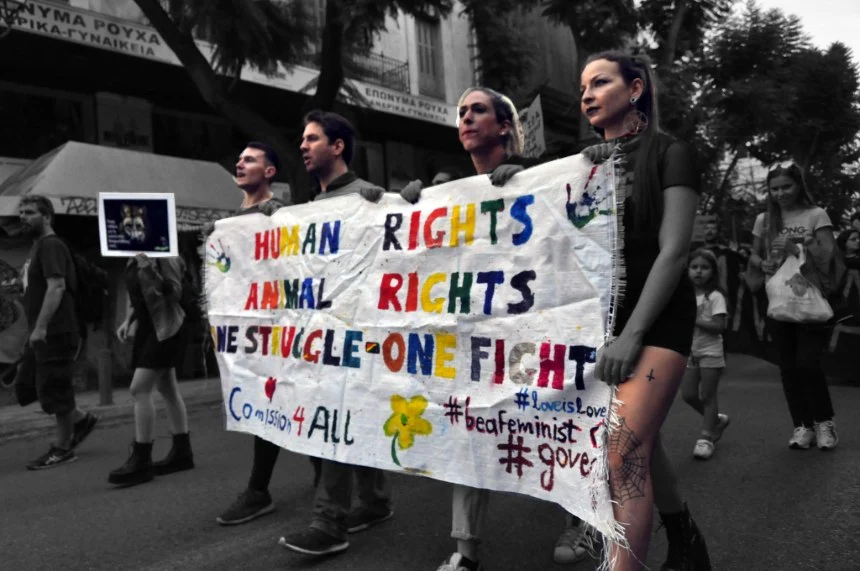Introduction: Conceptual Grounding for Animal Rights
The proposition that animals should be afforded human rights is a controversial topic of conceptual and political discourse. This article examines the political justifications for granting human rights to animals, arguing that such an extension is justified on both ethical and practical grounds.
- Introduction: Conceptual Grounding for Animal Rights
- Human Rights Denaturalized: A Political Construct
- Ethical Justifications: Principled Arguments for Animal Rights
- Discursive and Rhetorical Functions of Animal Rights
- Institutionalization and Legal Recognition
- Aspirational and Transformative Functions
- Socio-Political Interconnections: Human and Animal Rights
- Addressing Environmental Challenges through Animal Rights
- Conclusion: Integrating Human and Animal Rights
The central thesis is that human rights can benefit animals by addressing their suffering and oppression, and that animal rights, in turn, can enhance the protection and understanding of human rights. This perspective builds on the idea that human rights are not static or purely metaphysical constructs but evolve from social practices and historical contexts.
The core of the justice-based case for animal rights is that animals have intrinsic value and moral status, deserving of fundamental rights to protect them from harm.
Understanding this dynamic allows for a rethinking of rights to include non-human entities, thereby broadening the scope of justice and compassion within society. The article proceeds by examining the political conception of human rights, ethical justifications for animal rights, and the practical benefits that accrue from such an extension. It also addresses the potential challenges and concerns associated with this proposition, providing a comprehensive overview of the interconnectedness between human and animal rights.
Human Rights Denaturalized: A Political Construct
Human rights have traditionally been viewed as natural entitlements based on inherent human qualities. However, political conceptions of human rights challenge this view by emphasizing their practical and historical origins. Richard Rorty famously argued that human rights are products of human civilization and social practices rather than abstract metaphysical principles.
Various philosophical frameworks have advanced the case for animal justice.
This shift from a naturalistic to a political understanding of human rights allows for a more functional and context-specific approach. Political conceptions focus on the role and function of human rights within international and domestic practices. They view human rights as evolving norms that respond to historical injustices and societal needs.
For instance, human rights emerged as responses to atrocities such as genocide, slavery, and systemic oppression, shaping a framework aimed at preventing such abuses. This practical grounding does not diminish the moral force of human rights but rather situates them within the historical experiences and institutional contexts that give them meaning.
By understanding human rights as evolving constructs, we can better appreciate their adaptability and relevance in addressing new forms of injustice, including those faced by animals. This perspective underscores the potential for human rights frameworks to expand and evolve to meet emerging ethical and practical challenges, including the recognition of animal rights.
Ethical Justifications: Principled Arguments for Animal Rights
The ethical argument for extending human rights to animals is rooted in principles of justice and morality. Central to this argument is the recognition that animals, like humans, suffer from violence, oppression, and exploitation. Ethical theories that emphasize compassion, fairness, and justice demand that we address the suffering of animals, too.
Over the past decades, various philosophical frameworks have advanced the case for animal justice. These include utilitarianism, which advocates for minimizing suffering; deontology, which emphasizes duties and rights; and virtue ethics, which focuses on moral character and compassion.
The core of the justice-based case for animal rights is that animals have intrinsic value and moral status, deserving of fundamental rights to protect them from harm. By framing animal rights within the context of human rights, we acknowledge the shared experiences of suffering and injustice that transcend species boundaries.
This recognition compels us to extend protections that are traditionally reserved for humans to non-human animals, ensuring that their welfare is not disregarded. Ethical justifications for animal rights also highlight the moral inconsistency of protecting human rights while ignoring similar abuses against animals. Addressing this inconsistency requires a principled commitment to justice that encompasses all sentient beings, reinforcing the universality and coherence of human rights as a moral framework.
Discursive and Rhetorical Functions of Animal Rights
The use of human rights language in advocating for animal rights serves important discursive and rhetorical functions. In social and political advocacy, the rhetoric of human rights has a powerful capacity to draw attention to injustices and mobilize support for change.
Ecofeminists argue that the domination of nature and animals is intrinsically linked to the patriarchal oppression of women.
By framing animal rights as human rights, advocates can highlight the inadequacies of current animal protection laws and emphasize the moral urgency of their cause. This framing serves several purposes. First, it has an appellative function, spotlighting the suffering and exploitation of animals in a way that resonates with broader societal values of justice and equality. Second, it provides a contestational framework, allowing animal rights activists to challenge existing legal and social norms that perpetuate animal abuse.
This rhetorical strategy is not merely about rebranding but about aligning animal rights with the deeply held principles that underpin human rights, thereby enhancing their legitimacy and appeal.
Additionally, the discourse of human rights helps to build coalitions across different social justice movements, fostering solidarity and collective action. This discursive approach aims to shift public perception and create a moral and legal imperative for the recognition of animal rights, ultimately driving legislative and institutional changes.
Institutionalization and Legal Recognition
Institutionalizing animal rights as human rights involves translating moral claims into legally recognized rights within national and international legal frameworks. This process is crucial for providing robust protections against violations by both state and private actors.
Legal recognition of animal rights would impose duties on states to respect, protect, and fulfill these rights, similar to existing human rights obligations.
Industrial animal agriculture is a leading source of greenhouse gas emissions, deforestation, and water pollution.
One of the main benefits of legal institutionalization is the establishment of clear standards and enforcement mechanisms.
This ensures that animal rights are not merely aspirational but actionable, with legal remedies available for violations.
For instance, the duty to respect would require states to refrain from actions that harm animals, while the duty to protect would necessitate laws that prevent private individuals and corporations from exploiting animals. Additionally, the duty to fulfill would involve proactive measures to promote animal welfare and ensure that their rights are upheld.
Institutionalization also facilitates the universalization of animal rights, setting international benchmarks that can guide and harmonize domestic laws. This global perspective is essential in addressing transnational issues such as wildlife trafficking and habitat destruction. By embedding animal rights within legal systems, we can create a more comprehensive and effective framework for their protection, ensuring that these rights are respected and enforced across different jurisdictions.
Aspirational and Transformative Functions
Recognizing animal rights as human rights is not just about legal protection but also about fostering long-term social change. The formal recognition of these rights serves as a starting point for a transformative process aimed at reshaping societal norms and practices. Fundamental animal rights, once institutionalized, provide a basis for progressive realization—a concept originally developed for socio-economic human rights. This means that while full realization of these rights might not be immediately feasible, there should be a continuous effort towards achieving it.
Human and animal rights are not mutually exclusive but rather complementary.
For example, recognizing the right to life for animals would challenge entrenched practices such as industrial farming and meat consumption. Over time, this recognition would lead to changes in consumer behavior, agricultural practices, and dietary norms. The aspirational nature of animal rights helps to denormalize harmful practices and establish new ethical standards.
This transformative function is critical in promoting a cultural shift towards greater empathy and respect for all sentient beings. By embedding animal rights in the legal and moral fabric of society, we can gradually move towards a world where animals are treated with the dignity and compassion they deserve. This long-term vision underscores the importance of perseverance and commitment to the continuous advancement of animal rights.
Socio-Political Interconnections: Human and Animal Rights
The interconnected nature of human and animal rights is evident in the socio-political landscape, where movements for social justice often overlap. Historical and contemporary social justice movements have shown that the struggle for human rights is closely linked to the fight against animal exploitation.
These movements intersect and reinforce each other. For instance, the abolitionist movement against slavery in the 19th century also inspired early animal rights advocates, highlighting the shared principles of justice and compassion. Similarly, the feminist movement has long recognized the parallels between the oppression of women and the exploitation of animals, leading to the development of ecofeminism.
Ecofeminists argue that the domination of nature and animals is intrinsically linked to the patriarchal oppression of women. These intersections demonstrate that addressing one form of oppression can have positive ripple effects on other areas of social justice.
Furthermore, the principle of non-discrimination, a cornerstone of human rights, supports the extension of rights to animals by challenging arbitrary distinctions based on species. This interconnected approach strengthens the overall framework of rights and promotes a more inclusive and equitable society.
Addressing Environmental Challenges through Animal Rights
Institutionalized animal exploitation contributes significantly to several major environmental problems, including climate change, biodiversity loss, and zoonotic diseases. These environmental issues pose existential threats to human rights, making the case for animal rights even more compelling. Industrial animal agriculture, for instance, is a leading source of greenhouse gas emissions, deforestation, and water pollution.
By recognizing animal rights, we can address these environmental impacts more effectively. Reducing the scale of animal exploitation would mitigate these environmental threats, thereby protecting the fundamental human rights to health, food, and a safe environment.
Additionally, the exploitation of animals often leads to habitat destruction, which in turn drives biodiversity loss and increases the risk of zoonotic diseases. The COVID-19 pandemic has highlighted the profound interconnectedness between human health and animal welfare, illustrating how zoonotic diseases can emerge from wildlife exploitation and habitat encroachment.
Addressing these issues requires a holistic approach that includes the protection of animal rights. By safeguarding animals’ well-being, we not only enhance their protection but also contribute to a healthier and more sustainable environment for humans.
Conclusion: Integrating Human and Animal Rights
The extension of human rights to animals is both a moral necessity and a practical strategy for enhancing the protection of all sentient beings. This integrated approach recognizes the interconnectedness of human and animal welfare and seeks to address the root causes of injustice and suffering across species lines.
By adopting a framework that encompasses both human and animal rights, we can create a more comprehensive and effective system of protections. This holistic perspective not only addresses the immediate needs of animals but also promotes broader social and environmental justice.
The political and ethical arguments presented in this article highlight the mutual benefits of such an integrated approach, demonstrating that human and animal rights are not mutually exclusive but rather complementary. Moving forward, it is essential to continue advocating for the recognition and institutionalization of animal rights, ensuring that they become an integral part of our legal and moral frameworks. This commitment to justice for all sentient beings will pave the way for a more equitable and compassionate world.
Adaptation by Politics and Rights Review of an academic chapter, under license CC BY 4.0. Revised and approved by the author.









